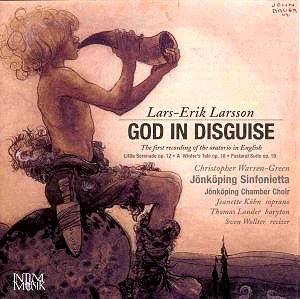AVAILABILITY
intimmusik@swipnet.se
www.intim-musik.se
Larsson's contented
pastoral muse is well represented here.
This Intim-Musik collection might honestly
have been badged as 'The Best of Larsson'
by a less tasteful company.
There have been more
than few recordings of God in
Disguise (Förklädd
Gud) including long-established
entries from Bis and Swedish Society
Discofil. This is the first one where
the narration is in any language other
than the native Swedish; the premier
recording of the work to be spoken and
sung entirely in English. The translation
is by the English composer John Hearne.
The narration here
is done with stilly awe by Sven Wollter.
While the Grecian classical scene is
the same as that of Bantock's Cyprian
Goddess, Nielsen's Pan and Echo,
Ravel's Daphnis, Peterson-Berger's
Second Symphony and Bax's Spring
Fire Larsson has his own confident
and modern voice. The piping (and there
is plenty of soloistic hay to be made
by the woodwind) is clear and clean.
The magically reverent kindliness of
the narrative is delivered in tracks
separate from the music; Wollter is
not called on to speak over the orchestra.
That spoken role has about it more of
Vaughan Williams' and Arnold's ‘Scholar
Gypsy’ (An Oxford Elegy) than
Arthur Bliss's heaven assailing actOR-narrator
(Morning Heroes).
The Larsson work represents
a playfully bemused Scandinavian 'spin'
on the Grecian classic idyll. The music's
mood is a Swedish counterpart to that
of the underestimated British composer
Geoffrey Bush - a light dusting of awe
over the honest beauty of the countryside.
John Ireland looked for the secret gods
of pre-Roman Britain while Larsson bridges
Swedish summer scenes to Mediterranean
idylls on the Grecian greensward. There
is nothing ill to come near thee in
this series of musical tableaux. The
first of the ten movements has a theme
that glances knowingly towards Wagner's
Siegfried Idyll and it is that
graceful theme that casts its prayerful
radiance through the last pages of the
work - full circle.
A Winter's Tale
derives from a 1938 Swedish
Radio broadcast of the Shakespeare play.
Its four movements were selected from
the 24 numbers written by the composer
for that adaptation. The first combines
intimations of Grieg's Morning and
a Mediterranean Daphnis. The
Intermezzo chaffs cheerily away
like a rather scathing Sibelius. The
Pastoral: has the jollity of
the King Christian II music and
of Sibelius 3. The Epilogue is
a real treasure including a great curve
of a romantic theme full of dignity
and tenderness.
The Little Serenade
has another chattering allegro
as well as a prayerful and submissive
adagio cantabile. The bucolic
allegro vivace has apple liqueur
wafting through the orchard. This work
could comfortably be mated with the
Wirén and with the lighter suites
of Sibelius like Rakastava, Champêtre
and Mignonne.
The Pastoral
Suite had its origins in another
work; this time for narrator and orchestra.
Poems were interspersed with musical
movements in Times of Day. The
suite is in three movements with the
confident rush of the overture preceded
by some tentative invocatory gestures.
Its rush and tumble, it smiles and charms
are a sort of marriage of Reznicek's
Donna Diana and Sibelius 3. The
Romance looks to the hesitant
hints in the foreword to the overture
and develops them mellifluously and
with unsullied nostalgia. The flighty
Scherzo looks to Sibelius 6,
vital with birdsong and lithe with echoes
of the avian chorus from Sibelius's
Nightride and Sunrise.
The playing and recording
quality encapsulate the innocence, warmth
and nostalgic sentiment of this music.
Good to see the name of Christopher
Warren-Green again after all this time.
This disc joins Intim’s
collection of the Larsson concertinos.
This is confident feel-good
music not afflicted with blandness or
facile emotion. It pretty much sweeps
the board in Larsson collections - especially
for non-Swedish speakers.
Rob Barnett
